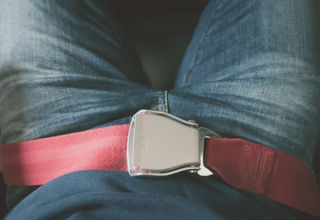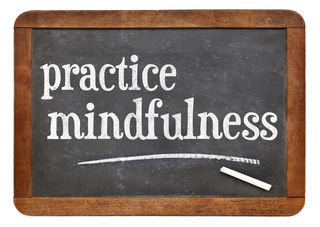OCD
Attitude Matters If You Want to Beat OCD
What manspreading, "c is for center," and a Buddhist equation mean for recovery
Posted August 8, 2017
If you have OCD and are familiar with the evidence-based treatment for the disorder, exposure and response prevention therapy (ERP), you are probably also familiar with the concept of making yourself uncomfortable on purpose. After all, that’s what ERP is all about: willingly confronting triggers that will provoke discomfort, so that your brain learns it can handle the uncertainty inherent in these situations. Doing so repeatedly and willingly helps your brain recognize that these triggers aren’t as threatening as it once thought, meaning that you’ll likely feel less and less discomfort with each repeated exposure to the situation.
But what happens when you weren’t meaning to be uncomfortable, you weren’t necessarily willingly stepping into discomfort, but it happens anyway? Can your brain still learn? Can something positive come of it?
Absolutely. If you have the right attitude.
C means “center”

Taking a ride on a plane provides many, many opportunities to practice both being uncomfortable and trying out new attitudes, and my recent trip to San Francisco on Southwest Airlines was no exception. I was in the last boarding group, Boarding Group C (“C means center!”), and I thought that surely I was going to end up in a center seat somewhere in the back of the plane (as you choose your seats once you get on a Southwest flight). But no! Luck was on my side. Seat 2B, a seat I make a game of trying to get on all my Southwest flights, was still available. Yes, it’s a center seat, but it’s right up front, so I don’t get stuck waiting to get off the plane, which is why I like it.
So I asked the man sitting in the aisle seat in row 2 if I could take the middle seat. He nodded and started to get up.
It was then that I noticed how large he was. Sort of like a linebacker on a football team, with broad shoulders, an expansive chest, and bulging arms.
I hesitated for a split second, noticing as he rose that he was probably going to take up not only his seat, but some of mine, too.
I might mention that the flight from Atlanta to San Francisco is about five hours. Given my druthers, I wouldn’t choose to be squished in a seat beside someone I don’t even know for that long. But I thought I was probably going to be in a center seat somewhere on the plane, so I told myself it wouldn’t be that bad, lobbed my duffel into the overhead bin, threw my computer bag into the seat, and squeezed into 2B.
Manspreading
I knew that I’d made a mistake the minute Mr. Aisle sat back down. He fastened his seat belt, did not lower the armrest between us, put his arms down beside him so that his right arm was in my seat, and then proceeded to spread his legs in a wide V position, taking up all his leg room and some of mine.

When I told Jeff, my Beyond the Doubt advocacy partner and a radio news anchor, about this when I landed, he laughed and said, “Oh, so Mr. Aisle was manspreading!”
“He was what?” I asked, confused.
“Manspreading. When guys sit down with their legs wide apart. We did a story once about a subway system that displayed posters in the trains asking guys not to manspread, as it doesn’t leave room for anyone else.”
Yes. Exactly. There was no room for me in my coveted 2B, because Mr. Aisle was taking up most of my space. I hadn’t sat there on purpose to be uncomfortable, and yet, within a minute of sitting down, I knew I was in for five hours of discomfort.
Or was I?
Suffering = pain x resistance

I am a big fan of mindfulness, and one of the most helpful mindfulness exercises I can do when I’m in pain or uncomfortable is to acknowledge the pain/discomfort, say “It’s OK you’re there, pain/discomfort,” and then explore it mindfully with my five senses. Most of the time when I do this while meditating, I cannot keep my mind on the pain/discomfort for very long. It becomes bored with it and moves on to my grocery list, or something I forgot to include in my latest writing project, or wondering when my cat Milo is going to crawl onto my lap (as he likes to do when I’m meditating).
But if I resist the pain/discomfort, boy, does my mind get stuck on it! If I say, “Oh, this pain/discomfort is awful! I can’t stand it! I want it to go away!” then sure enough, it seems to stick around. It’s as if my mind says, “But why? Why does the pain/discomfort need to go away? Oh, it must be bad! If it’s bad then we should keep it close to us, right? Keep your friends close, but your enemies closer? Right, right?! So I’ll hold onto it for us and focus on how bad it is so that we don’t forget, as that’s what will save us!” Which, of course, just makes things worse.
The Buddhists sure explained my mind well when they coined the sage equation Suffering = Pain x Resistance.
The most important change we can make
Realizing the situation that I was in, as Mr. Aisle lounged in his seat and mine, I decided to do two things. One, I was not going to cower in my seat and let him take more room. Two, I was going to accept that no matter what I did I probably couldn’t do much to change the situation, but I could change my reaction to it.
“I’m going to use this as a five-hour exercise in tolerating discomfort,” I said to myself, as I claimed my arm and leg space, moving my right leg where it would naturally be if I wasn’t trying to avoid Mr. Aisle’s left leg and wedging my right arm into the minuscule space between my body and his left arm.

This was super uncomfortable. I didn’t even know this guy, and my leg and arm were pressed right up against him.
“I can handle this,” I said to myself, over and over again. “I’m very excited to have this opportunity to practice being uncomfortable. This is a great opportunity.”
After ten minutes or so, I was so engaged in the movie I was watching that I forgot all about Mr. Aisle. He even ceded some territory to me every now and then. But our arms and knees still had a fair amount of contact over the five-hour flight, and each time we “reconnected,” so to speak, I would tell myself, “I can handle this. I’ve got this. It’s not a big deal,” and within a few minutes, I would forget that Mr. Aisle was even there. In fact, Mr. Aisle and I had a few short conversations over the course of the flight, and he was actually quite nice.
What did my brain learn during my five-hour flight? A few things.
- That it could handle discomfort.
- That doing so enabled us to have an enjoyable flight.
- That having someone else taking up part of my seat on a long flight is not that big of a deal.
Had I reacted differently, by getting upset, or focusing on how annoying Mr. Aisle’s manspreading was, or trying to get away from contact with him, my brain would have learned the exact opposite:
- That it can’t handle discomfort.
- That being uncomfortable means the flight is ruined.
- That having someone else taking up part of my seat on a long flight is a HUGE deal.
What is the difference between these two outcomes? It’s not the situation, as I had very little control, if any, over the situation. It was my attitude.
Attitude matters...a lot

If you have OCD, the attitude you use to approach your exposure exercises is critical. My hypothesis is that if you choose a “resistance attitude” by telling yourself you can’t handle things, you don’t want to be in the situation, and this is horrible, you are sabotaging your exposures by tainting what your brain learns from the experience. A resistance attitude is tantamount to a compulsion, in that you think you can only survive the situation because you are resisting and white-knuckling your way through it, and your brain incorrectly pairs resistance with surviving the experience, just like it would incorrectly pair a more traditional compulsion with surviving the experience.
Instead, choose to adopt a Triple A Attitude, even—and maybe especially—when you are thrown into an unexpected, uncomfortable situation:
- Appreciation: appreciate the opportunity to practice handling discomfort, as that’s what makes you stronger.
- Authenticity: you are not your doubt and fears, and you have what it takes within you to handle this.
- Abundance: the world is not, as OCD would like you to believe, out to get you.
Now, if we could just get Southwest to give me some of my airfare back for not being able to use my whole seat on that flight…. :)
Sign up for KeyWords, our free daily motivational emails for people with OCD, if you’d like to learn more about a Triple A Attitude, one of our Four Keys Out When Locked in Doubt,




